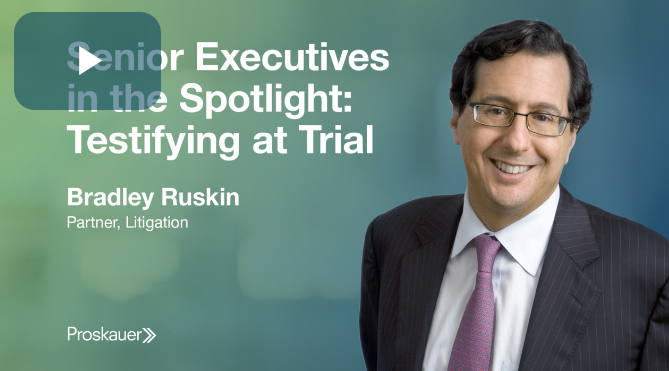Senior executives, particularly CEOs, are often viewed as the face of the company when they testify at trial. Their testimony is an opportunity to humanize their company and their credibility is often critical to how a jury thinks about the case. But the witness chair is far different from the Boardroom. Partner Brad Ruskin shares the necessary steps to prepare senior executives to testify effectively at trial.
Transcript:
Bradley Ruskin: When senior executives testify, they are going to be viewed as the face of the company. And so, the way he or she comes across is going to be critical to how a jury thinks about really humanizing the companies that we represent.
Thinking about trial testimony, it really starts at the deposition. So you need to identify who's going to testify as early as you can. Because if they don't know a deposition, they're not going to be an effective witness at trial.
"Spend time preparing the senior executive to know the themes in the case."
Bradley Ruskin, Partner, Litigation
The only way to be prepared is to take time. That you have to go through all the questions that you may ask, and actually to hear it all in their words. Until you hear it in the witness's words themselves, you never know how it's going to come out. And you need the witness to be completely comfortable expressing it, and then make sure that your questions on direct fit the way the witness is going to answer the question.
Never be surprised by them in a deposition or a trial and be comfortable explaining or responding to them in a way that isn't defensive and is direct.
Cross-examination is where the rubber hits the road at trial. A witness is really assessed and a case is either often won or lost. Senior executives are used to being in control. They set the agenda in a meeting. Cross-examination is different. The examiner is going to be in greater control of that process, and it's critical that the senior executive not come across as arrogant or as condescending.
They have to stay patient, be confident, be strong, have the same type of tone and style that they had on direct, but be responsive to the questions that are asked in ways that directly deal with it. You need to think about every question the adversary may ask and spend the time with the senior executive asking those questions, going through that cross.
And one of the things you want to be focused on when you have a CEO testify is what are the right subjects for him or her to testify on? What are the areas where they will be most knowledgeable, most effective, so that all of their testimony is compelling. I want the CEO always to feel like I am there in their corner, I am their trusted advisor, and in that way, I think they have comfort that I'm there fighting for them, all of the time.
Senior Executives In The Spotlight: Testifying At Trial (Video)
The content of this article is intended to provide a general guide to the subject matter. Specialist advice should be sought about your specific circumstances.



